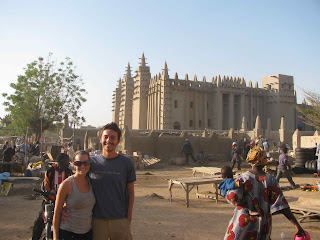After a few days in Cotonou (which was surprisingly overpriced for a West Africa city!), we were off to Abomey. We took our first bucket shower at the lovely Auberge D’Abomey, ate delicious Beninoise cuisine at Chez Delphano, and arranged a four-hour tour of the remaining Dahomey palaces with an English-speaking guide.
The Dahomey people were a bloody lot and had the dubious honor of never having been enslaved... because they hunted prisoners from neighboring tribes and sold them as slaves to the Europeans. Many of their 18th century palaces remain intact along with the decorative bas reliefs containing the unique symbols of each king – Glele chose the lion and a scimitar to symbolize his reign; Kplenga a vulture and a gun; Tegbesson a shirted buffalo and a gun; Benanzin a sharp-toothed fish and sword. Notice a common theme? Their art isn’t all that advanced; their coats of arms sort of look like children could have made them. I guess when your main focus is war, not the arts, this is probably appropriate.
After our informative moped tour of Abomey, it seemed only fitting to end our Benin trip with a visit to Ganvie, a village about 30 minutes north of Cotonou. Back when the Dahomey people were blazing a bloody path through Benin and either enslaving, killing or driving out local people, some locals decided to capitalize on the fact that the Dahomey people were prohibited for religious reasons from entering water. They headed out into Lake Nokué and built a whole city on ebony stilts and became master fishermen. Although it probably never happened, I sort of envision them taunting the angry Dahomey from dugout canoes while the Dahomey impotently wave their war implements from the shore.









































